#absolutely do not have complete understanding of The narrative
Text
About the playlist:
Finn was very much capable of making it private. He didn’t. He chose to display this publicly. If it was personal and he didn’t want it scrutinised he would’ve kept it to himself. At the very least he clearly doesn’t care who sees it. It’s not in any way invasive to discuss unless someone is using it to make assumptions about a real person instead of a character.
He is not unaware of his fanbase. The guy has over 200k followers on Spotify and is verified, and he knows he is most famous for the hit show he stars on. A hit show he is currently filming. And he decided to make a playlist with “ST” blatantly in the title. You decide if he had no idea what he was doing lol. If it was just a bunch of songs he likes he typically titles those things like ‘the tunes’, ‘jams’, ‘summer’ or even just ‘my playlist’. Things that actually make sense in that context. “STurn” does not, in fact it’s completely nonsensical unless you assume there’s some non-surface meaning there.
There are songs incredibly specific in terms of relating to the themes of Mike’s storyline and also the show in general. To me, saying that’s coincidental on a playlist with such a name feels like the bigger reach. Also the songs are not random, if you listen they actually have a pretty cohesive narrative.
The last song is the same as the last song on Will’s official Spotify playlist…
He has made character playlists before! He has one explicitly for Richie. And also he’s apparently said he listens to music to get into the headspace for filming, and is literally known for it on set. This is absolutely something he would do.
All in all I think it’s logical to deduce that this is the playlist he’s using to help get into character for Mike. Other explanations I’ve seen just seem like skepticism for the sake of skepticism (which I understand & each to their own but also it’s not like he could just title it ‘Stranger Things’ or ‘Mike’ without getting in trouble lol. This way he retains plausible deniability). That being said if you’re interested stay tuned cause I’m working on a dive into the songs & how they could relate to s5 Mike :)
#byler#I’m being pedantic but that capitalisation didn’t just happen lol he had to manually do it#he is a conscious human like the rest of us he is aware of his actions and presumably does them for a reason 😭
364 notes
·
View notes
Note
For sure and fair play, HP was a long project! But yeah, JKR fiercely defending her inconsistencies almost forces us to fiercely point them. Out of spite. I do get that many issues were out of Harry’s radar and understanding, but JKR trying to convince the audience through interviews that the wizarding world doesn’t have the same prejudices as the muggle world just makes me conclude that she must be herself incredibly unaware of the privileges herself and people in her circle possess. Plus the whole HIV parallel that just sounds so misguided and sours the text to me. Yet here I am! Love your blog xx
the lycanthropy-as-aids metaphor is extraordinary in how tone-deaf it is and it pisses me off...
especially because it doesn't make sense at any point in the story. the complete transformation of how house elves think of their enslavement between chamber of secrets [in which dobby mentions whisper-networks of politically-engaged elves decrying their treatment at the hands of wizards] and goblet of fire is really fucking irritating, but it has some slight defence in the narrative shift that the series undergoes after prisoner of azkaban from children's boarding-school literature to something approaching folkloric epic.
[that is, chamber of secrets needs to wrap up with dobby being freed, the malfoys getting their - comparatively benign - comeuppance, and everything being well, because children's stories always end with that everything back to normal vibe, and so the fact that harry has just learned that the wizarding world has institutionalised chattel slavery and been remarkably unbothered by that fact can be shelved by the genre conventions. after prisoner of azkaban, the books end more ambiguously and are more interlinked, as they start moving towards their big conclusion in deathly hallows, and are also darker in tone. and yet she decided to use this shift in tone... to make elves love being enslaved...]
which is to say, perhaps the lycanthropy-as-aids metaphor could be justified as a standalone plot device within prisoner of azkaban - since the reader does hear lupin explain not only the shame and stigma wizarding society's poor understanding of his condition causes, but also how the state's callous discrimination against werewolves impacts his ability to access healthcare, education, and employment - which then doesn't work after the series' narrative shift, when jkr wanted to introduce characters like fenrir greyback...
except it doesn't work even then! because at the end of prisoner of azkaban lupin turns into a rampaging monster who has a desperate, primal urge to eat children - and reveals his condition to be legitimately dangerous to an extent which entirely justifies why parents would feel uneasy about him being employed in a school.
[and - especially - being employed without dumbledore appearing to put any safeguards in place to keep both lupin and his students safe.]
one part of the tragedy of the aids crisis is baseless social stigma at an individual level, absolutely, and lupin - who is a nice [ish] man who doesn't meet the stereotypes wizards appear to have of untransformed werewolves - suffers from this.
but another is the way this stigma drove a state-sanctioned looking-the-other-way and refusing to act while the bodies piled up - something there is no parallel for in the series' worldbuilding around werewolves, not least because it tends to have a positive view of states and their institutions [state corruption is always located in individuals - fudge, umbridge - rather than in the structures which enable them, which are seen as fundamentally sound, for example] which i would imagine most people who know even a cursory amount about the official response to the aids crisis are unlikely to share...
and another is that - since hiv has a very, very long asymptomatic period - it was spreading without anyone knowing it existed for years, if not decades, before it burst into the public consciousness with death on wholesale scale. and then it continued to spread in terror and confusion - for years, you couldn't know if you had it until you started getting sick, and then, when you could access tests [if you could access tests], you were told it was a death sentence, and you would be unable to pinpoint when and by whom you'd been infected, and you would be unable to know how many people you might have infected in turn.
nothing about the series' presentation of lycanthropy corresponds to this.
but, with this said, i think there are two parallels between the conditions which could be interesting in the hands of someone who approached them with care.
the first is to see lupin's role as the series' one "good werewolf" as a mirror to the fact that public opinion became considerably more sympathetic to those living with and dying of hiv/aids when it began to emerge that people [white! "respectable"! heterosexual!] had been infected via blood transfusions and treatments for haemophilia. queer men and intravenous drug users could be dismissed as having brought their infections upon themselves... but not someone [white! "respectable"! heterosexual!] who went into hospital for a routine operation and came out slowly dying.
lupin - the son of a prominent civil servant [with all the class status that entails], bitten as a child through no fault of his own, hogwarts educated, connected to establishment figures like dumbledore - makes a great poster child for a milquetoast "werewolves aren't all bad" campaign which manages not to offend the state's sensibilities by asking it to stop demonising pretty much every other werewolf in history...
the second is to think about the generational divide.
in countries where access to appropriate medication is widespread [and that there are many countries where this isn't the case shouldn't be forgotten], hiv is easily treatable, easily manageable, easily rendered untransmissable, and easily preventable. the quality of life - and the life expectancy - of hiv positive people is now broadly equal to that of their hiv negative peers. the number of aids-related deaths worldwide annually has more than halved since 2010 and, in 2024, it is possible to say that virtually nobody who is newly diagnosed with hiv will go on to develop aids.
this is - sincerely - one of the single greatest achievements in the history of medicine. and it's completely changed how we think and talk about hiv, what it means to be diagnosed with it, what it means to live with it, and what it means to know [and to love, and to fuck] someone who has it.
if we imagine that there are similar advances in the treatment of lycanthropy - with the wolfsbane potion, which seems pretty bare-bones, replaced with something which made the impact of the werewolf's transformation even less severe [or which prevented it altogether] - then being a werewolf in the 2020s would mean something very different than it did in the 1980s.
and if - say - lupin is right, and teddy inherits his condition, thinking about how enormously different his experience being a werewolf might be from his father's [even at a very basic level - not having to turn down invitations based on the moon cycle, for example], and how he would come to understand himself and understand lupin through this different experience, would be a genuinely fascinating premise for a fic.
but not if jkr was writing it.
38 notes
·
View notes
Note
The big difference between Clara and Ruby at least so far is that a lot of people don't seem to get it but Clara was a subversion of a mystery girl because the whole point was the Doctor was wrong to treat her that way and his grief for the Ponds made him see a mystery that wasn't there, they'd have gotten along better sooner if he had treated her like her own person and she was normal, just doing what she did because she was a normal companion defending her friend the Doctor she jumped into his time stream just as Clara Oswald the person who cares for the Doctor it wasn't some big mystery. She was this manic pixie dream girl in the Doctor's eyes (because he needed her to be, to distract from the pain of losing Amy and Rory) but that was never actually who she was. Ruby seems, at least for now, to have this big mystery gimmick but played completely straight. She has a mysterious backstory and snow powers and a song in her DNA. Clara was like a normal person who just happened to be split into different parts of the Doctor's timeline. For all people say Clara was this special mystery girl, she isn't that remarkable in Season 7 when you REALLY think about it.
hello anonymous ask. i appreciate your insight into clara. i will admit i was making a tongue and cheek comparison, drawing on the surface level similarities. i enjoy both characters so it wasn’t meant to be any sort of diss on them, just a passing observation.
while i agree that clara can absolutely be read as a subversion of the manic pixie dream girl trope, i feel like it gets muddled in the weird misogyny of eleven’s era. moffat is a solid writer but series five through seven really suffered with the characterization of certain female characters. characters i adore like amy pond and river song ended up overly sexualized and at times reduced to vessels for the doctor’s growth rather than their own. their stories both relied on something needing to be solved about them from our titular male character, with amy’s crack in her wall and river’s true identity. eleven ends up at the crux of their storylines, actively entrenched in their personal histories and driving their stories rather than being a facet of them. i believe that clara was somewhat affected similarly if not to the same extent. i think the subversion would have played a lot better had there not been the earnestness in the “inherently mysterious sexy characters” reinforced by previous seasons.
eleven was riding the coattails of ten’s “he’s so young and hot and how could women not be interested in him” deal so i won’t place the blame solely on moffat but i also think the fact that romance as a potential aspect of their relationship (one-sided or not) being so strongly implied may have also inhibited the understanding that clara wasn’t playing into the archetype. that particular era of the show was dominated by male writers, so i would not be surprised if that anything to do about the lack of clarity regarding clara’s character.
i think you are absolutely correct, there is nothing special about clara from an objective perspective. however through the narrative framework (i.e. oswin/victorian clara, leaf falling at the right time and place to bring her into existence from the rings of akhaten, etc.) it implies a certain sense of destiny, where one could draw up the mythologizing of her character. since we ultimately are viewing the show part ways through the doctor’s perspective (and subsequently through the lens of his grief as you pointed out), this is kind of where we get the weird overlap. it’s paradoxical in a way where a mystery does in fact exist, yet by the doctor acting on investigating it he is also bringing it to fruition in the first place. like you stated, clara acts reasonably according to her circumstances rather than intentionally generating intrigue.
as mentioned, when clara is treated as a normal person is when she truly thrives with the doctor. my favorite of her moments are when she’s at her most mundane. her run with twelve is super compelling for that exact reason, she is intriguing not because she is some cosmic mystery but because of her similarities to the doctor.
with ruby currently, we don’t know all that much about her. it’s unfortunate how close we are to the end of the season and there still seems to be a gap in the information we know about her whether intentionally or not. because of the lack of exploration of her character, she becomes inherently reduced to the mystery surrounding her. however, in this case, the doctor is less actively involved in solving that mystery, it’s more latent curiosity. as opposed to series 7, i don’t think it’s meant to be the main overarching plot of the season or it is at least is tied into the susan twist plot line rather than just standing alone. she appears on a lot more of an equal footing to the doctor too. ultimately, while the whole mystery surrounding her is more genuine, hers is still unresolved.
my comparison between ruby and clara wasn’t meant to be too serious, just noting on the shared tropes that surround them. because in the end, while they both appear to be seemingly normal people affected by some much deeper mystery, that’s where a lot of the similarities stop. clara’s happenstance as you said vs. ruby’s bordering on supernatural traits. eleven thinks clara is deliberately hiding something while fifteen understands ruby to be just as clueless as he is. more can be said. different stories are being told and equating them was perhaps a little reductive.
i hope this make some sort of sense and isn’t too incoherent. all this to say, i agree with you for the most part and i think regarding clara especially certain outside forces ended up in her characterization rather than just narrative purpose. i hope you don’t think i am attacking you for this or anything, i really enjoyed your thoughts.
#doctor who#dw#dr who#clara oswald#ruby sunday#character analysis#anon ask#i had thoughts and i hope they make sense#clara is misunderstood character and perhaps i have fallen into that trap#love her though#gotta keep the textual analysis nice and sharp#thank you random commenter for the ask
25 notes
·
View notes
Text
no, no, i don't mean "witch" in the cartoonish old woman with crooked teeth and warts sense, no i don't mean it in the second-half-of-the-20th-century-sitcom sense either, or even the modern pop feminism sense, i mean it the umineko way, which is "someone who understands the narrative through and through"
#to address any who will justifiably point out that characters like MARIA and ANGE or EVA#absolutely do not have complete understanding of The narrative#yeah well it's more like “someone who has total understanding of A narrative” but it didn't sound as cool#also i love lying what can i say#ERIKA also does not fundamentally understand beatrice's catbox either#but by virtue of creating a possible interpretation#she masters the ins and outs of the narrative she creates#so it counts#umineko#i read umineko once 10 years ago i barely remember any of it dont look at me#kontxt
170 notes
·
View notes
Note



WHAT AND WHO NOW????!!??!
*coughs to cover up maniacal laughter*
okay so basically you know how Eclipse dies the second time in cannon when Sun blasts him to another dimension and he gets disintegrated at Solar's place? Yeah, well that doesn't happen here. Sun happens to take pity on him and lets him go. And remember how Solar Flare was a prominent figure in Eclipse's head while he was going a bit stir-crazy up in space with the star? Well, prominent exposure to the star leads to some fun issues with Solar Flare's AI that Eclipse doesn't have time to look into until he's out on the streets looking for somewhere to crash for the night after being kicked out of the plex. He hides behind some dumpster and does a quick check in his mental space because he can't hear Solar Flare...only to discover that the AI is dormant.
Essentially, the star's energy, as we know in cannon, was corroding Eclipse's body and mental state from the inside out. Lucky for Eclipse, because Solar Flare was considered an outsider to the body (as a result of Eclipse inhabiting it for a longer period of time than Solar Flare himself), Solar Flare was the one who bore the brunt of the damage, keeping Eclipse's AI mostly unharmed. Unluckily for Solar Flare, his AI faced irreparable damage, and, as a result, went into a sort of comatose-like state to prevent further damage. Though Eclipse tried, he was unable to coax Solar Flare out, which essentially meant he had a not-quite-dead roommate dorming with him in their head. And, because Solar Flare's AI was newly-developed and considered secondary to both Fazbear Entertainment and KillCode, no copies of the code or schematics were made, making it nearly impossible to repair or recode.
This revelation is absolutely earth-shattering to Eclipse. He shouldn't really care, he tries to tell himself-it's not like he had enjoyed Solar Flare's company: the AI had made it much more difficult to carry out any of his work and planning. Still, Solar Flare had stuck by him (even though it wasn't really out of his own volition), attempted to comfort him within his last moments, and took most of the hits for him. He'd seen parts of Eclipse that nobody else had, and now he was gone because of Eclipse's foolishness and poor planning.
So, Eclipse opens up his dentistry to make enough money to buy resources to build Solar Flare from scratch. It's the least he can do, he reasons, and it's not like he has any other life purpose anymore. He works long hours during the day and then hunches over his desk creating new schematics at night. His low battery level and poor mental state sometimes impact him severely, to a point where he experiences hallucinations of the character sharing his mind and soul...
#dentist au#dentist eclipse#asks#tsams eclipse#solar flare#i don't know how else to tag this#rambles#thanks for the ask!#sorry i didn't respond to it right away#i saw your doodle request but i can't get to it just yet cuz i have some work to do#should hopefully get it done at some point tho!#anyways#someone remind me to doodle some angst comics at some point#oh yea and this is absolutely me shoving solar flare back into the narrative#cuz i was a little upset that he died and then was just. never brought up after that#but i completely understand that the VAs and the writers can't put everyone everywhere#which is why this au was made!#(it was also made because i want eclipse to experience psychological suffering in a domestic environment)#(cuz i like the idea of 'oh yea i'm fine i have a business now and we've got nice neighbors and stuff')#(while also suffering from the aftermath of his previous method of living)#(he gets to cope without more stuff being shoved on his plate)#tsams au
4 notes
·
View notes
Note
This isn't a gotcha, so please don't take it as such, but would yuou be willing to explain what it is about VAL that makes her such a favourite of yours? I can't stand her myself, she comes across to me as a bully given god-like power that she abuses for her own amusement, and I've seen you acknowledge as much, but we draw completely different conclusions from that. I just want to understand your perspective.
i've been anticipating a question like this for a while now, so i'm more than happy to answer for you!
you're right, VAL is in some ways a "bully given godlike power" as you put it, and there's no avoiding that (nor do i want to). and yeah, i do like her in part because of that, because i have a fondness for horrible fictional characters and in particular "bad victim" archetypes, of which VAL certainly is one. but i think what makes her compelling to me, rather than repulsive, is that she is fundamentally a cautionary tale and a tragedy. in-universe, she's the scapegoat. the example. the "make the right choices or this could be you". she's inescapably, heartbreakingly human in her awfulness, and that makes her terrifying, but it also makes her deeply sad (at least to me).
i also strongly believe in rehabilitative/restorative justice, so for me, wanting better for VAL is about my real-world principles to a degree. i can't and won't argue that VAL doesn't function as an uncomfortable allusion to a lot of atrocious crimes against humanity (by humanity) within the narative, and that anyone who finds her upsetting or even hateful for these reasons is absolutely justified in doing so. however, she's still a fantasy entity at the end of the day. she's not a 1:1 stand-in for real-world abuses any more than, say, a vampire or werewolf, which plenty of people are more than happy to explore the nuances of. and there's also the question of what punitive measures would even achieve in her case, beyond personal satisfaction for the one administering or spectating them (which is not to say that wanting to punch VAL makes you as bad as she is, just that her arc is, among other things, about how cycles of abuse and violence perpetuate). the worst that could possibly happen to her has already happened. she's been tortured. she's been taken advantage of for her mistaken belief that working for and with the system has the opportunity to benefit her, and died for it. there's nothing to be "learned" from her punishment that hasn't already been shown to us. that she hasn't already internalised. if she were ever to develop a stable conscience, that would be punishment enough in my opinion.
despite being a victim of people not entirely unlike VAL, i personally am not her victim, so treating her with sympathy and kindness whilst acknowledging the elephant in the room that is her many (fictional) war crimes is not something that requires any cognitive dissonance on my behalf. i would cautiously argue that the narrative agrees with me somewhat in this regard - the few times VAL is treated to a genuine act of kindness with no ulterior motives, it shatters her composure and outward conviction that what she's doing is necessary for her personal satisfaction, and even prompts her to reconsider on occasion (sparing the woodsman comes to mind). i'm not saying anyone needs to hug her and tell her she's valid, but if all it takes is some genuine good intent to get her to engage in introspection, i'm willing to be the person to offer it.
#ummmmm yeah. i like her. thank you so much for the ask though! id been wanting to talk about this#VAL thesiltverses
180 notes
·
View notes
Text
Clear Sky is a Monster.
Of all the characters in Warrior Cats, I think Clear Sky was the most heavily mishandled.
At every turn, the narrative begs you to sympathize with him, to "understand" the "misunderstood." To this end, his brother Gray Wing is used to "keep faith" in his inherent goodness, his abused son, Thunder, is forced to go back to him over and over, and his second dead wife is completely lobotomized in death to absolve him of all sin.
Because of this, of all this set-up for the "redemption" arc they're trying to tell in the last three books, DOTC is Clear Sky's story. Everything primarily exists to benefit and serve his arc. Thunder and Gray Wing might have POVs, but HE is the character who truly drives the plot. So in order to HAVE conflict for that back half, two evil foreign cats, Slash and One Eye, are summoned to act as contrast.
Their narrative purpose is to display "true evil" to make Clear Sky look less bad in comparison. Unfortunately, Clear Sky is the most malignant, deadly character who has ever blighted Warrior Cats.
The "pure evil" examples they summon aren't effective contrasts because they're flat. Clear Sky is what real abusers look like.
His rhetoric is what it sounds like when a cult leader is trying to keep control over a group. He lies when it benefits him, justifies his actions with his tragic backstory to assuage his guilt and manipulate others, and violently lashes out when his feelings are hurt before blaming his victim for making him angry.
He only made "some mistakes" in that SOME of his actions were accidents-- the vast majority of them were malicious, self-absorbed, intentional choices to punish, hurt, and kill others.
I've spoken about Bumble. I've tallied his body count next to Tigerstar. I've talked about how his infant son's death was his fault in sequel books, and called attention to the infected wound face shoving scene that no one talks about. I can't fit every detail into a single post-- because he's so rancid that I would practically be posting entire books.
So what I want to do here is tackle the heart of Clear Sky. Everything he does, everything he's motivated by, is absolute and utter control over other people. He leverages his "trauma" to evoke empathy from his targets to make them easier to manipulate. He's a dirty liar. He breaks down to physical violence when all other tactics stop working.
He's one of the most severe and realistic abusers I've ever read about outside of very adult literature-- and when I read the reasons why he's attracted to Star Flower, my stomach immediately lurched.
The Killing of Misty
Starvation Rhetoric and the Memory of Fluttering Bird
Aside; a question
Hunger as a punishment; he doesn't care about starvation
Exoneration arc
Predation: Star Flower is a replacement for his son.
I think that index is an evocative content warning. But to say it again; this post contains child and domestic abuse, physical assault, public humiliation, incestuous grooming implications, and a lot of murder.
I need to start with the death of Misty. I see a few people saying that Clear Sky killed her for "being on his land" or trespassing, but this is actually a misstatement that I feel is important to correct.
Misty and her children were on their own land. It was her house. Clear Sky killed her to take it.
This is one of the most important details to remember about Clear Sky, that this is the consistent end point of his obsessive need for power and control. By harassment, by violence, or by death, he will brutalize anyone who does not give him what he wants, or who makes him feel bad, and find some way to justify it.
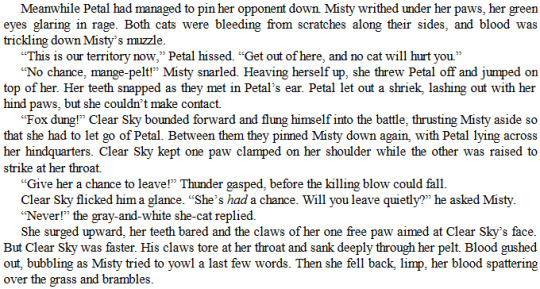
This territory expansion was for no logical reason. There was plenty of food and plenty of land. Any aggression that's happening on this territory is in response to how he's been stealing land and mauling people.
When it's found out she was fighting to defend her children, Clear Sky's immediate response is to slaughter them too.
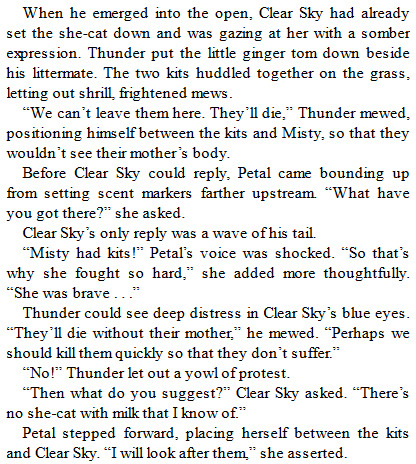
Petal doesn't have milk either. It wasn't about the logistics. He wanted to kill the kids, because looking at them made him feel bad, and she just managed to stop him.
Starvation Rhetoric and the Image of Fluttering Bird
It is often said that Clear Sky is doing this because he's "traumatized" from how his little sister, Fluttering Bird, starved to death in the mountains. That the emotion came from wanting to feed people. That's incorrect. It wasn't about food. Fluttering Bird's death, and all the "starvation" he's faced, are used as manipulation tactics to guilt, influence, and control other characters, particularly when he might meet resistance or be held accountable for something.
It was always, ALWAYS, about control.
He does not care about actually helping people; "Starvation Rhetoric" through Fluttering Bird is an image he can invoke to justify the actions that are as bloody and cruel as the one this post starts off with. Either in his own mind, or in the minds of the cats he's manipulating.
He does this to Falling Feather, before slicing her face open in anger when she doesn't buy it. He does it to Rainswept Flower, before he strangles her to death. And he does it in the chapter just before Misty's murder, both to his Clan and then to Thunder,

Clear Sky climbed up in front of an entire crowd and gave a grand speech about hunger and "adjusting" the borders around territory he plans to conquer. When he gets to "forgiveness" he feigns pain to make his point because he is performing. If the sentiment is not a total lie, then at bare minimum, he is intentionally playing this up for the crowd.
He is rallying the Clan to support his violence against the cats whose land he wants to steal, and selling it with his life's hardships.
The audience is clearly well-trained, because several cats recognize the cue, particularly Frost who is praised for loudly comforting him. This signals "loyalty" because showing your sympathy towards his "suffering" is how this type of emotional manipulation works. It creates a persecuted, righteous in-group.
He's also apparently used this tactic before, since this entire crowd knows what "I Would Never Forgive Myself " means.
He's made sycophants out of his followers. Like a cult leader.
His abused son, however, hasn't been fully indoctrinated yet. Seeing Thunder uncomfortable with the idea of expanding the borders for no reason, Clear Sky calls him over for a personal propaganda session.
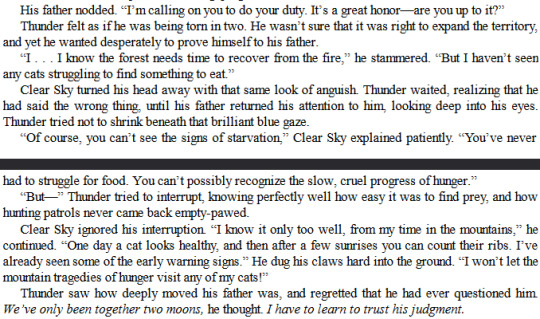
Clear Sky begins the exchange by calling this a "duty" and a "great honor." Immediately framing what he plans to do as righteous.
He puts on the act when Thunder shows resistance, dramatically pausing to let the guilt trip sink in.
"Thunder waited, realizing that he said the wrong thing."
And then Clear Sky launches into infantilizing Thunder, talking down to him like a child who's too inexperienced to see the "signs of starvation," acting like he's being "patient" in "explaining" it.
And then we get it. "I know what starvation looks like (so stop trusting your own eyes) because I have been through more than you (so shut up and do what I tell you), and I'm being a HERO for what I'm about to do (so opposing me would make you a bad person)."
Thanks to these crocodile tears, looking "moved," the act works. The victim is immediately wracked by guilt because the abuser seems genuinely emotional.
He even lovebombs him over the corpse of Misty in the next chapter, making Thunder feel threatened.
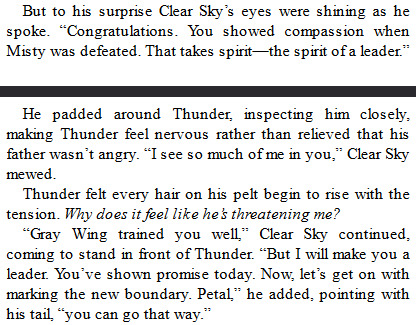
Thunder doesn't have the words to describe what is happening to him, but he knows that this sudden snap to praise isn't natural. That something is very wrong.
A Question.
Before I move on to show that this IS an act, and that he is lying about how important avoiding starvation is to him, I will ask a question. Please think about it, because I promise I mean it genuinely;
Why does it matter if Clear Sky actually believes this or not?
The victims are just as dead either way, yes? Thunder is just as abused and guilt tripped. The entire Clan has been driven towards violence while coddling and cooing at their Supreme Leader. Clear Sky is slowly annexing the entire forest. If you have ever accepted that he had "good intentions" as an excuse for the harm he did, or that abuse and murder was what he imagined was "the right thing," or that his trauma justifies the way he leverages his own pain to make cats do what he wants... why do you think that?
Why does that make it morally better, as the narrative concludes? Would you accept the same for every other WC villain or antagonist? Tigerstar? Slash? Tom the Wifebeater? Brokenstar? Rainflower?
How could you tell the difference, if you couldn't read their actual thoughts on the page? ...are there any other "good intentions" you've accepted, somewhere else?
Don't share that answer with me. It's a question for you. Sit with it.
Hunger as a punishment; he doesn't care about starvation.
...but, regardless, Clear Sky is not deluded about starvation. It's a justification for his obsessive need for control, and always has been. There was no shortage before stealing Misty's land and kits, he is fully aware that there's more prey than they can eat.
He punishes Falling Feather with hunger and harassment for thought crime, by briefly thinking of leaving. But first, he invokes Fluttering Bird at her like he did before, flying into a screeching fit of rage when she doesn't buy it,
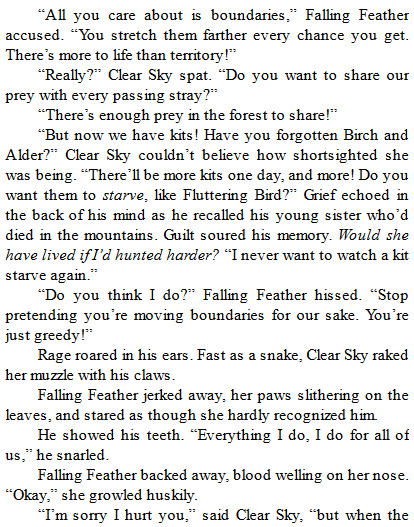
"I'm sorry I hurt you... BUT" is THE wifebeater phrase. THE stereotypical line of a domestic abuser. "I'm sorry I hit you... but it's your fault for making me so angry."
She went through the same exact starvation he did, calls out that he's just framing his greed as being for the collective benefit of his subjects, and is assaulted for that.
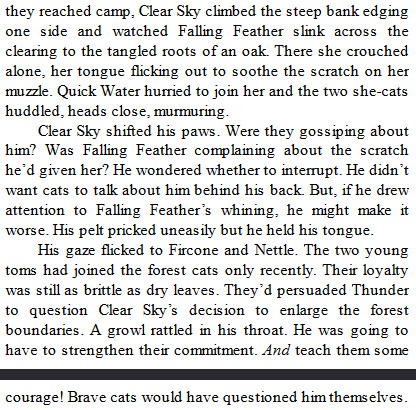
When we're in his head, we see his REAL concerns are not about hunger. He invoked Fluttering Bird to try and make her shut up and bow down to him; what he's focused on is her "gossiping" and "whining" about the open wound he left on her face. He's still furious at Fircone and Nettle for how Thunder QUESTIONED him. So he will "strengthen their commitment."
When "starvation" DOES enter his thoughts, it is to assuage his own guilt and JUSTIFY what he already did. What he already WANTS to do. It's post-hoc.
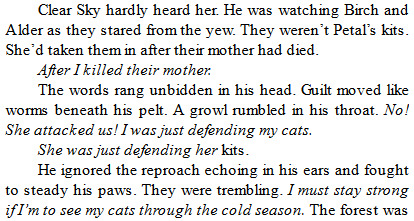
He had to suppress his own guilt at how his greed and ambition made these children into orphans, completely unable to admit that he's ever been wrong or has a change to make, so he invokes the starvation rhetoric at himself to excuse it. So he feels less bad.
Everything, EVERYTHING, in this confrontation is about his pleasure at being able to torment his subordinates. To continue the abuse when the initial confrontation is over. If it isn't pride in his power and control over them, it's plain sadism.
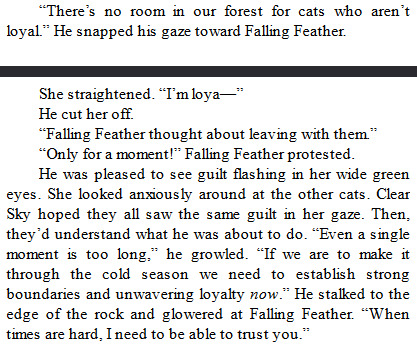
He invokes starvation in front of the crowd, again, after being pleasured at the guilt in her eyes, hoping that everyone sees her writhing with shame and embarrassment. Fear wasn't at the root of why he assaulted Falling Feather; rage was, and now he feels better that he got to humiliate the person who offended him.
Starvation Rhetoric is a manipulation tactic.
It goes RIGHT BACK to his twisted idea of "loyalty." Obedience.
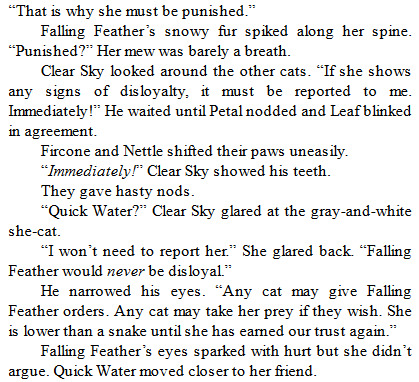
A cat who's actually, primarily concerned about starvation wouldn't encourage other cats to steal her food if they feel like it. He wouldn't be using it as a weapon to retaliate against her because she hurt his feelings.
This is paired with the fact he restricts and monitors the diet of his cats. They eat when he allows it, and only what he gives them, in spite of there being piles of dead animals rotting, going to waste.

We then find he personally doles out food from these piles, plucking carcasses off them and flinging them at his cats, one by one. Probably so he can watch how grateful they are to him and make sure they stay a little hungry-- and definitely because it means he can control WHO gets to eat at all.
If Clear Sky chucked a mouse at Falling Feather and someone took it? She would have gone hungry. For not groveling to him. Like when he decides to starve her brother; a hostage who he promised to feed and care for.
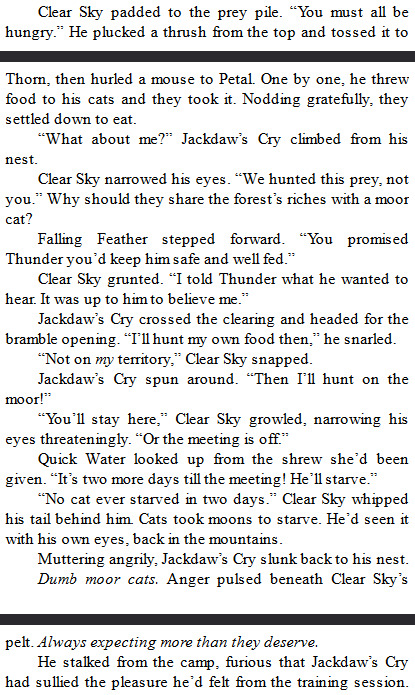
He's a dishonest snake. He lied about abandoning baby Thunder, calling it a "test of strength," he lied about Bumble's death, he lied about keeping Jackdaw's Cry fed.
And he lied about starvation to Thunder, because he was just making up an excuse to steal more land.
He wasn't "seeing the signs" of starvation when he moved to "adjust" his borders. Even FURTHER into this so-called "delusional slip" into tyranny, he's freely admitting that it takes months for a person to starve when it benefits his sadistic need to punish undeserving cats.
"Dumb moor cats, always expecting more than they DESERVE."
Not need. DESERVE. It's not a delusion about starvation and it never was. STARVATION is how he CONTROLS SkyClan, and once again he's angry that his pleasure has been sullied.
The massacre at Fourtrees was started over Jackdaw's Cry catching a bat after being starved, on land that Clear Sky has decided RIGHT NOW that he also owns, because it mades him think about being disobeyed.

The bat is forgotten as Clear Sky pivots into a tantrum, wanting to make his family HURT for being 'disloyal' and 'ungrateful.' For leaving him. He LIKES seeing people grovel, cower, and beg, getting PLEASURE from watching how he can hurt and command other cats, and if you don't give him what he wants he will kill you.
Which, make no mistake, is what the "First Battle" actually is. Clear Sky attempting to murder those who don't worship him or swear their undying fealty to him and his twisted dictatorship. Particularly his own son, the most prominent victim of his emotional abuse.
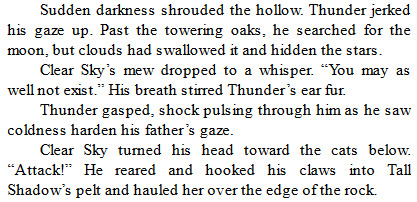

It's not about the bat. It was never even about food or starvation. It's about retaliation for any perceived lack of control.
Once again he breaks out starvation rhetoric to try and manipulate someone, and when Rainswept Flower doesn't buy it just like Falling Feather didn't, he murders her in another fit of entitled rage.
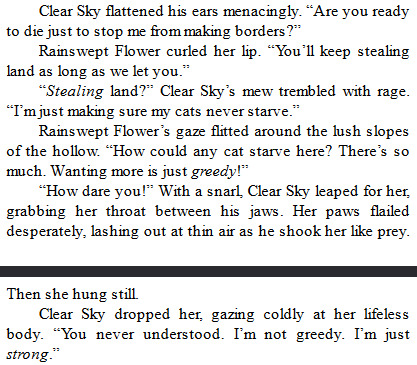
Exoneration arc.
At the end of this battle that was entirely his own fault, we're introduced to the hollowed-out ghost of Storm. She has been flushed of all personality, so that she can be the perfect narrative mouthpiece.
She accepts yet another Fluttering Bird Invocation in spite of how we saw it's not sincere. He was lying the entire time and using starvation rhetoric as a manipulation tactic to get control over his victims.
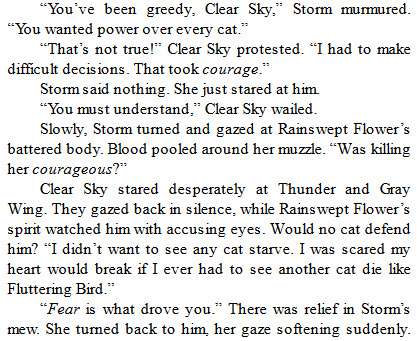
And that's it.
That's the consequence. Storm's a little mad at him until he says "Buttering Flird" and she swoons.
He doesn't have to be ""afraid"" anymore because the cats just invented an afterlife to believe in. He keeps all of his power and influence and gets off scot-free, because "guilt" (which we SAW him repressing anyway) is supposed to be the best consequence for murder, abuse, and tyranny.
The husk of Storm even materializes again at the end of book 5 to say it outright; he "never drove anyone away." Not even after Book 4 where it's also his fault One Eye took over his Clan for 5 minutes. It was just destiny.
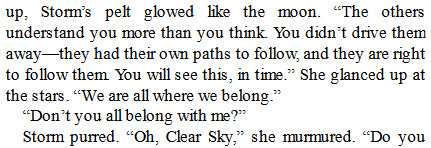
His "redemption arc" is just an exoneration arc. The narrative doesn't think he really did anything wrong.
EVERYTHING about Clear Sky has ALWAYS been about making grabs at power, but since the narrative didn't see a problem with him extorting his personal tragedy and the death of a child, his own sister, he continues doing it. As if these behaviors are normal personality 'traits'.
Even when that sister COMES OUT OF HEAVEN TO YELL AT HIM DIRECTLY,
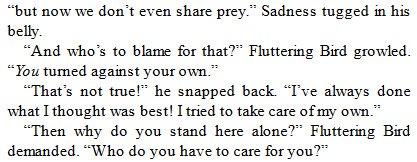
He finds a way to COMPLETELY miss the point, so he can interpret her words in a bizarrely specific way that will conveniently end with him being the supreme dictator of the entire forest. Just like he ALWAYS does.
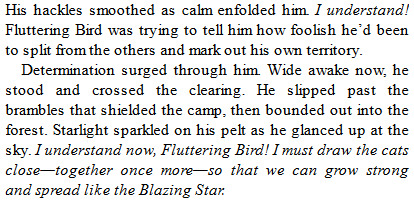
It's the entire 5th book. Clear Sky trying to convince everyone, including himself, that it's Fluttering Bird who wants him to grab at power, NOT himself and his own ambition, that THIS time, he promises, for realsies, it's actually about keeping everyone safe.
But just like ALWAYS, because he does not change, when this tried and true tactic manages to work on Thunder, during ANOTHER exchange where he's dramatically pausing and using the cold shoulder to make his pitiable act land harder,

He lapses right back into bullying his child, creating situations where Thunder will have difficulty or be put in pain, so that he can have an excuse to mock and belittle him.
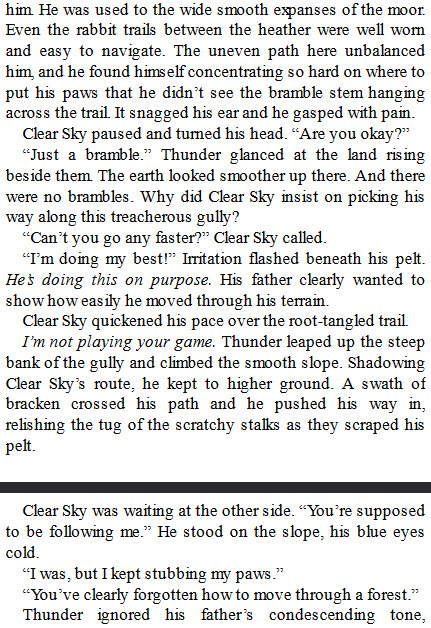
And this all comes to a head when Clear Sky takes romantic interest in Star Flower, his abused son's previous romantic interest.
Predation: Star Flower is a replacement for his son.
Direct parallels are drawn between Thunder and Star Flower. Star Flower contrasts her loyalty to her father to Thunder's "disloyalty" to his own, in an appeal to Clear Sky.
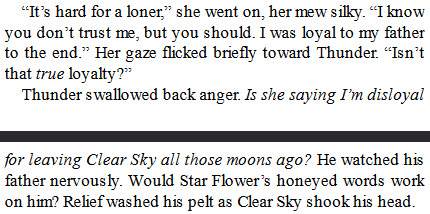
Clear Sky brushes it off for now, citing that he cannot accept her because of who her father was.
But then, Thunder makes the connection between himself and her, because he knows what it is like to be a victim of parental abuse and correctly clocks that they have this in common,

On his vouch, Clear Sky accepts her into the group. She starts trying to offer himself to him; hunting twice as hard as the others, self-imposing harsh conditions like taking a wet sleeping spot. In their second interaction, Clear Sky begins to take interest in her.
Thunder himself points out that Star Flower is seeking an abusive tyrant to replace her own father, which reads like he's deflecting the stress of how his father is abusing him to deny a connection he already made. As if Thunder sees so much of himself in Star Flower that it makes him (rightly) feel sick that his father is romantically invested in her;

Thunder then goes on to follow his own advice and form his own Clan, because Clear Sky IS like One Eye... while Star Flower remains here. At Clear Sky's side. Because she feels like this is what she "deserves," that she "understands" him, truly believing that her crime (warning her father that Clear Sky brought an ambush in case he lost the 1 on 1 death match he requested, which he did) are on the same level as his abuse and murders.
Clear Sky is attracted to Star Flower because, in his own words;

She is young.

She will not betray him.

She won't question him,
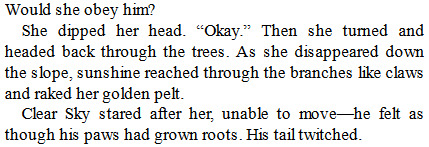
and she obeys him.
We've seen what "betrayal" is to Clear Sky-- not taking his excuses or his beatings. To "disobey" is betrayal. To "question" is disobedience.
These are ALL things he's tried to drill into Thunder. We saw him happily exploit their difference in age to tell him he can't have an opinion. He constructed humiliating games in retaliation for ever being questioned. He tried to murder Thunder and his friends for their "betrayal." Even now, being disobeyed causes explosive reactions.
He was previously grooming the things he now identifies as attractive in a young woman into his child.
If your body becomes too useless to serve him, like Frost and Jagged Peak, you're thrown out. If you don't unquestioningly follow his bloody commands, like Falling Feather or Thunder, you're subjected to abuse and public humiliation. If you're in his way, like Misty or Rainswept Flower were, you die.
If you meet all of his expectations...

You will be in a horrific position where you will never have agency over your own life ever again. Every move, every word, will have to be carefully crafted so that he feels like you're "loyal" to him by the arbitrary standard he feels that day. Never step out of line, never doubt his decisions, never live for anyone except him and the children you will give him, not even for a moment, because then you will not be "worthy" of his grace.
Star Flower would be in serious danger if this series wasn't written by abuse apologists. They accidentally wrote a perfect reflection of how child abuse victims often find themselves in unsafe and toxic romantic relationships with large age gaps which mirror what they went through as kids; but this team doesn't clock it, playing this relationship as wholesome and genuine.
He finally has someone who ""understands"" him. Because they think the character they wrote is misunderstood.
but reality is plain to see.
Clear Sky is a monster. The most realistic monster in all of WC-- far, far closer to real life predators and domestic abusers than the "born evil" rogues like Slash and One Eye. The Erins seem to believe that what separates Clear Sky from One Eye is "fundamental" good and "fundamental" evil, when the truth is that they'd be separated by very, very little.
If they had realistic motivations, they would be exactly like the character their existence is meant to excuse.
Slash and One Eye HAD to be kept flat and one-dimensional. If the book was more earnest, the only difference between Clear Sky and One Eye would have been that One Eye is stronger. So strong that Clear Sky needed to manipulate the other groups into helping him.
While anyone can change, not everyone will, and Clear Sky has no reason to. He sees no consequences. He has everything he wants; power, a pretty and obedient young mate, and unchecked authority over a brainwashed forest cult. There is always a victim on a leash, a naive enabler, or a bunch of desperate and gullible marks somewhere in his proximity to bully into doing his dirtywork
Whether his "intentions" were sincere or not (evidence points towards not) at its root it was always about control. Power is something he perpetually keeps, and continues to violently use.
#Cw incest#Incest implication#Child abuse#Cw child abuse#Domestic abuse#Cw domestic abuse#Clear Sky#Warrrior cats analysis#Clear Sky wc#Star Flower#Dotc hate#Star Flower wc#Thunderstar#Cw Abuse#Abuse#Cw grooming#Grooming#Ask to tag#I know this is a really fucking heavy one#I had several people read this for me beforehand to double and triple check what I'd written.#And im relieved that it's finally finished.
388 notes
·
View notes
Text
The 12th House in Astrology 🧜♀️🧚♀️ 🦋
(this can apply to both tropical and vedic placement of 12th house because regardless of the system employed, the energy felt and experienced is the same :-)
Most people have a lot of prejudice about the 12h and its energies. There is a largely negative portrayal of it in the mainstream astro community and very little nuanced discussion of the same. So, I thought I'd make a post exploring the 12th and final house in astrology and add more to the existing narrative regarding it.
The 12h is commonly described as the house of loss, liberation, isolation and decline
This house is said to governs misery, waste, expenses as well as divine knowledge, sympathy, Moksha (final emancipation) and life after death. It is also the house of detachment.
Now those are a lot of very contradictory terms. How could a house govern both loss and divine knowledge?
The 12th house and water houses (4h, 8h & 12h) in general are very complex and easily misunderstood. The thing about water is that it has no shape or form of its own, it takes the form of whatever vessel its poured into. another thing about water is that its the most easily polluted element. Water energy is one that must be precariously balanced because these natives easily absorb the influence of others (good or bad), this is one reason why the 12h is the house of "loss" because it truly is the death of the individual. you know those quotes about "i am an amalgamation of every person ive met, every book ive read, every song i loved...." 12housers are actually built like that.
being a 12h native can be rewarding because you absorb absolutely everything like a cosmic sponge but on the other hand, its very easy to lose all sense of self.
especially natives with 12h stelliums may often find it difficult to not take everything so personally. this is not because they think the world revolves around them but because its hard for them to separate themselves from others and their actions. they're personally of the type where everything they say or do is tailored specifically to the person they're interacting with. they may not even be aware that they're doing this, they pick up on energies almost by osmosis and guide their conduct that way. however they must realize that this is peculiar to them and is not something others are naturally accustomed to doing.
there is a reason why Venus exalts in the 12h. you lose all sense of self and give yourself completely to your lover with utmost devotion. love is sacred and profound to them, they will do absolutely anything for their love. which is why they have to be so careful with picking their partners. they have limitless capacity for giving but if you give to the wrong person, you'll be drained. when you merge with the right person, your cup never goes empty with your giving because your union satiates you completely.
if we were to think of houses 1 to 11 as a path of linear development, starting with the 1st house of self & identity and ending with the 11th house of friendship, community & legacy, then we will understand that after an individual goes through all these stages, the only thing left for them to do is seek liberation from this cycle; this is why 12h is the house of Moksha. once you've fulfilled your material desires, you will feel a lack in your life and the only thing left to do is pursue the path of spirituality. Moksha is however not given to one; one must strive for it.
this journey is a deeply personal one and liberation from one's ego and earthly pursuits is far from easy. no matter what these natives do, ultimately, they wont feel satisfied unless they've nourished themselves spiritually.
sometimes these natives may indulge in drugs or other substances to fill the void but as they evolve they will understand what theyre truly yearning for is the spiritual truth.
more often than not, these natives experience "spiritual awakenings" completely unprompted. god decides its time and it happens. much of their early life can be very dark and this "awakening" marks the beginning of a shift in their life. this happens in stages depending on the level of their spiritual evolution.
the 12th house is the house of isolation because what these natives experience is not something that others can understand easily. they are the most likely to develop psychosomatic conditions, simply because their energetic body is so susceptible to influence.
think of the vast endless ocean. can one individual possibly drink up all of that water? its absurd to even consider it. thats kind of what its like to be a 12h native. there's a limitless reservoir to tap into, the energy is so vast that its confusing and disorienting and you have no idea what to do with it. its very easy to be misguided as well. this is why its the house of decline. you have to constantly be on the look out in order to avoid the pitfalls, otherwise its easy to stagnate and easy to harm yourself.
There is a Latin quote that goes as follows:
"What nourishes me, destroys me"
This sums up 12th house energy pretty much. Its the energy of opposites and paradoxes. You need this endless reservoir to function, its the thing that feeds you but if you're not careful, it can also lead you to your own ruin.
Fun fact: Angelina Jolie has this quote tattooed on her. She is a Revati Moon. Pisces occupies the 12th house.

remember that Pisces' symbol is of two fishes swimming in opposite directions. this shows that the innate nature of these natives is to be torn between polarising energies and opposing forces. it is a balancing act to say the least.
these natives are easily misunderstood, simply because there is SO much to them. whatever you think they are, thats what they're not.
going back to the cosmic ocean metaphor, its easy to see how such abundance can feel like an excess and lead to misery and wastefulness. its simply a LOT to handle, not just for others but even for these natives themselves. this is one reason why so many of these natives tend to keep to themselves.
even the more sociable 12h natives often have an interior life that no one will know about, they have a whole another side to them that they keep separate, just because they want to assert complete ownership of this private side as something that belongs only to them and the other, more "public" side that they give to others.
these natives are the most empathetic and if you look at the charts of most "legendary" actors, they'll either have pisces/12h luminaries. empathy does not quite cut it, they can not only feel what others are feeling but embody it fully and experience it as their own. this is what makes them incredible actors. even non-actor 12h natives process things this way and often find that others around them are insensitive or lacking the same capacity. they do not understand why others don't feel as deeply as they do or understand situations the way they do. they find society at large to be very callous and apathetic.
a 12th house native is also capable of feeling apathy and absolute indifference but this is very selective; the 12h is the house of detachment because as it is, they're tethered to the world by a thin cord and are only very mildly connected to things. they're in this world but seldom inhabit it. another side to this is that they're wildly imaginative. although mercury debilitates in the 12h, it does not affect the native too badly, as they simply channel their thoughts into other forms. they are gifted at communicating abstract ideas and make excellent artists due to the same reason. robbed of any sense of what is "practical" or "realistic", they roam free in the realm of the mind. many abstract, surrealist and expressionist artists have either Pisces or other water sign placements in their big 3.
these natives live a life of non-being, as they're already so detached from everything, including themselves; this is not negative on its own and will manifest differently for different individuals; this can mean that they're extremely empathetic or detached to the point of inaction and passivity in extreme cases; they dont find a lot of things to be meaningful and its hard for them to apply themselves because of it. this gives us a glimpse of what life is like after death.
the 12th house also represents spirituality, introspection, foreign travels, hidden enemies, & the subconscious mind and it is the house of endings and undoing.
12th house natives are always intrigued by all things foreign, they feel like they do not belong to the place they're from and feel connected to cultures and people that are foreign to them. since they themselves feel like an alien or are made to feel that way, they feel naturally at ease in foreign places and cultures where everything is alien. they often settle overseas.
these natives court attention wherever they go, because the 12h energy is a very distinct and potent one. a lot of celebrities have it and its a very common fame indicator. due to this reason, they also attract enemies who remain unknown to them. these natives are seldom if ever, engaged in actual feuds with people and if they are, its usually for righteous reasons or because the other person started it. theyre wayyyy too peace loving and lowkey to pick fights with others. this is why they dont know who is speaking ill of them behind their back. they're always minding their own business and it surprises them that others are not doing the same.
everybody is guided by their subconscious and one major part of spirituality is to try and make ourselves more conscious. 12h representing spirituality (the cosmic ocean) makes even more sense considering its opposite (2 fishes swimming in opposite directions) which is the unknown, the subconscious. to be spiritual means to seek truth and to seek answers and swim towards the subconscious to shed light to it and understand it better.
lastly, it is the house of endings and undoing. 12h being the final concluding house represents the end of the cycle. when a cycle ends, the energy is of a complete transformation. only when something has reached completion can it come to an end. the butterfly does not emerge unformed but as a completely fully formed butterfly. the end marks the beginning. the 12h gives way to the 1h.
the creature in the cocoon was not a butterfly. it only became a butterfly when it emerged from the cocoon and to do so means loss of an old identity, loss of self, loss of all that you've ever known. this is your undoing. in order to become somebody else, in order to ascend, we have to be willing to undo ourselves. this is essential to any spiritual practice. we have to rid ourselves and our flimsy shell of identity in order to grow further.
for the same reason, 12housers are constantly transforming. they're the type of people who seem to have lived 10 different lives in one. be it their style, lifestyles, jobs, you name it, they're constantly undoing and transforming themselves. it seems to be the only way they know how to live. once theyve gathered all they can at one place, they outgrow it and change themselves almost entirely afterwards as they venture into something new.
thats it for now. i hope this shed some light on the 12h condition hehe<333
#astrology notes#vedic astro notes#astrology observations#sidereal astrology#astrology#astro observations#astro notes#astroblr#12th house#twelfth house#pisces#astro community
735 notes
·
View notes
Note
recently finished batgirl 2000 and i'm feeling Insane about her. do you have any opinions on the run? the character herself?
bro cass cain and batgirl 2000 are litchrally on my mind 24/7 and the more i think about her the more unhinged i become. how perfectly she mirrors bruce’s own internal struggle. her love for all things living. her desire to change. her disconnection from everyone in her life by speaking a language only her mother knows. her belief in the good. her absolute self-conviction and confidence to the detriment of her own life. the roses. wow wow wow
the more i read the more ive completely lost patience with comic fans who totally ignore or rebuke her as a character in comparison to bruce’s other kids. talking about the male robins with her noticeably absent is an immediate close tab. “she’s boring” “she’s underdeveloped” “she’s not as interesting” just tells me they’ve never actually read her run, or engaged with her character in good faith. her total exclusion from fan content about the waynes, her absence in fanfic, her reduction to a smiling, placid little girl who isn’t allowed a dissenting opinion. she has a single comic run from the early aughts that’s better than anything published this decade please be so incredibly serious!!!
she’s the most like bruce by any metric. dick understands bruce better than anyone, but cass is bruce, for both the good and bad. he sees her commitment to giving everyone a chance, sees her devotion to life, and is both awed and horrified. there’s a bit outta persephone that i still think about a lot:
Cassandra replies: “I was born into violence. Not to this life, but something worse. I was made to hurt people. I chose differently. I changed the path and found this. This new life, new purpose, new home.” She taps the symbol on her chest. “This, I wear to help people. To protect them. To start each day better, and brighter. The way I grew up… it was isolated, and lonely. I spoke a language no one else understood. There was no kindness because a weapon is to be used. Used to hurt, and cut, and kill. Who cares what a tool thinks?”
in my mind she is thee only choice for batman if bruce retires — for literally anyone else it’d just be character regression. dick would rather kill himself. the cowl would kill tim. jason needs to grow his own morals. damian works better as a narrative foil by attaining his own mantle, his own destiny. if nightwing is what batman could never be, then cass is what batman should be. she cares about the mantle, and has made it her own. she embodies all of bruce’s worst habits, but overcomes them. she is what gotham truly needs.
#ready to talk about her any time any place#cassandra cain#batgirl#batman#bruce wayne#dc comics#batfam#the ask and the answer
287 notes
·
View notes
Text
Show must go on...
... and rather very much in your face, mind you.
Scottish Xena posted two stories at about 7 AM, counting calories, and, in the process, making sure to address roughly any objections that were ventilated on this side of the fandom, including this very page. See for yourself...

What are the odds she'd be talking about nutrition? Right. I am not an idiot. I know when something is way Over The Top - less is more, Xena. Less is always more: there was no need to overdo it like that, placemat and all, if you wanted to remain credible. You read us and you have been instructed to do so, just to perfectly stick to your walking, talking and very profitable Local Innuendo script.
Fair enough. And then, you also tell us that you will be at Hyrox today around noon, to film some ESN promo: your bread and butter, of course. S is just for shits, giggles and that Instagram yield:

So, there's that. *urv connecting dots like crazy, without having the slightest clue of what was discussed at that table. Her own brand of cheap fanfic for the masses, for the other five clowns commenting, out of which three at least are her own sock accounts.
Cue in the Useful Idiot. The Brazilian Tourist and Fan. Uma senhorita tão desagradável, who changed her story in between her first reaction reel and the debrief, back at her suburban Airbnb or where the fuck that was filmed.
First reaction reels:
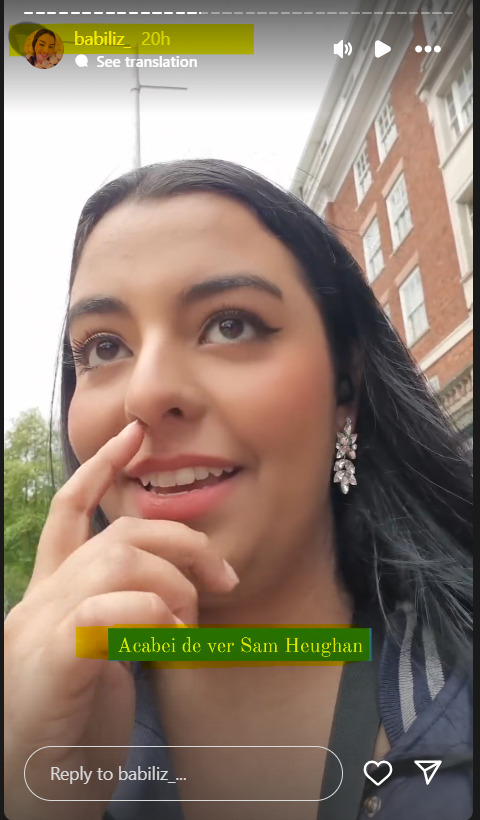
'Just saw SH.' Not alone, oh no: 'com uma moça'. With a girl. So yeah, she had qualms asking for a pic.
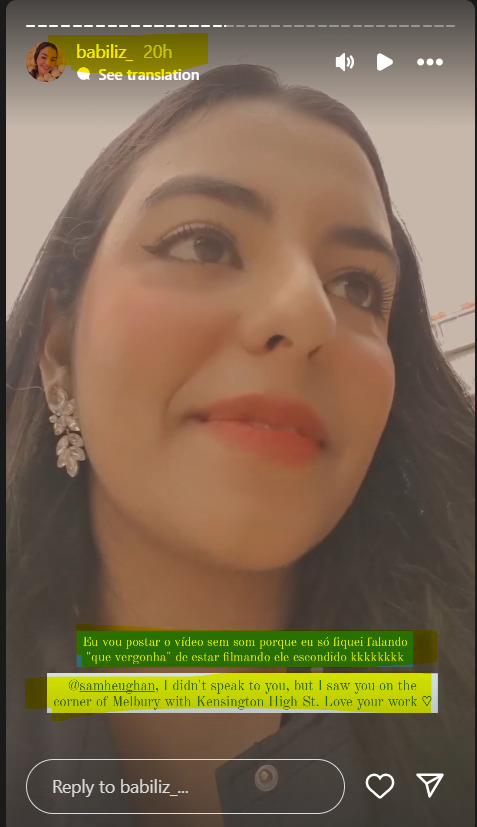
First lie and dramatization. She posts a message for S where she explains she did not dare approach him, but she saw him alright. The one in Portuguese is completely different, though: 'I am going to post the video without sound, because I could only say "what a shame", while I was filming him on the sly. LOL.' I guess she thinks we are all idiots, or something. Also, in her reel, she confirms: 'ele estava almoçando com outra pessoa'/he was having lunch with another person. So far, so good, right?
Six hours later, a second debrief batch of reels, taking her reader's questions. The narrative changes, with a strong bias:
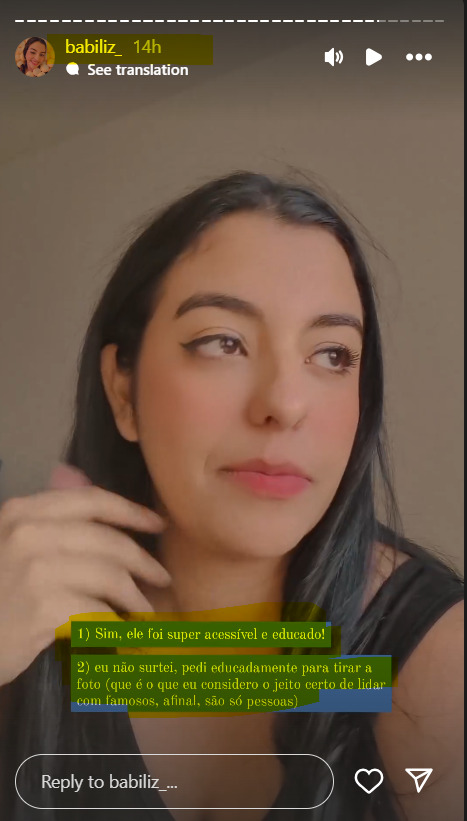
'Yes, he is super accessible and educated! I did not freak out, I just politely asked to take a pic (what I do consider the right way to approach famous people, at the end they are still human beings).'
For the people in the back: she is a lady. And a liar. The worst kind of liar, actually: a narcissistic one. Let's see what else she takes great pains telling us: 'ele tem um fandom bem tóxico'/he has a very toxic fandom. From now on, we just know what to expect, right?
Second answer, she explains he is very tall. He went inside to pay the bill and then he also went towards the bathroom (wtf?), she followed him inside, she asked for the menu, he finally went out and she approached him ('abordei' - 🙄) between the door and her table. Classy.
Cue in to a third answer (and second lie) to a very odd question: 'what did he smell like?' or something along those lines. For this one, I had to ask confirmation from Shipper Mom, who told me two things (she knew next to nothing about the whole episode- no bias): ' it's damn hard to understand what the hell she is talking about, she is eating half of her words. Plus you can tell she is lying.'
He doesn't smell, she tells us. But hey, she also freaked out a bit, finally (I thought she hadn't?!) and then well, 'ele estava com outra pessoa, uma moça, deve ser a namorada dele'/ he was with another person, a girl, probably his girlfriend'. But then he went inside (again? wasn't he coming out of the venue?), 'and the girl stayed at the table'. Things go murky afterwards, like they absolutely always do: she tells us she spoke to her (?), but would not say anything more, yet making sure to tell us she 'saw both of them'.
If anyone has a better version than mine, please step forward: we listened three times in a row, with Shipper Mom, a teacher of Portuguese and published literary translator. She was appalled by this young woman's carelessness and mendacity.
The Brazilian Tourist Fan is 23 years old (and it shows), she presents herself as a journalist and writer:

Seriously? What are the odds?
And finally, to wrap it up, the classical cheering moment, at yesterday's Hyrox: ' yeah, Sarah, nice!'

Nice, indeed.
FFS. Will it ever end?
Yes, it will. Anything ends: even Stalin's terror.
126 notes
·
View notes
Note
Do you have any games that involve urban fantasy with less focus on fighting than something like Dresden or Shadowrun?
THEME: Urban Fantasy (Minimal Fighting)
Hello there! What I've got here is quite a mix, I wasn't sure how much violence you wanted (or didn't want) so I have a little bit of romance, a little bit of nostalgia, and a little bit of horror!


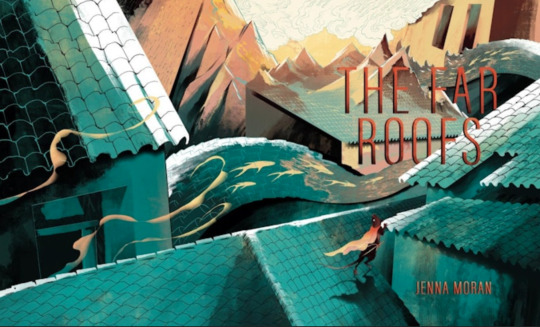
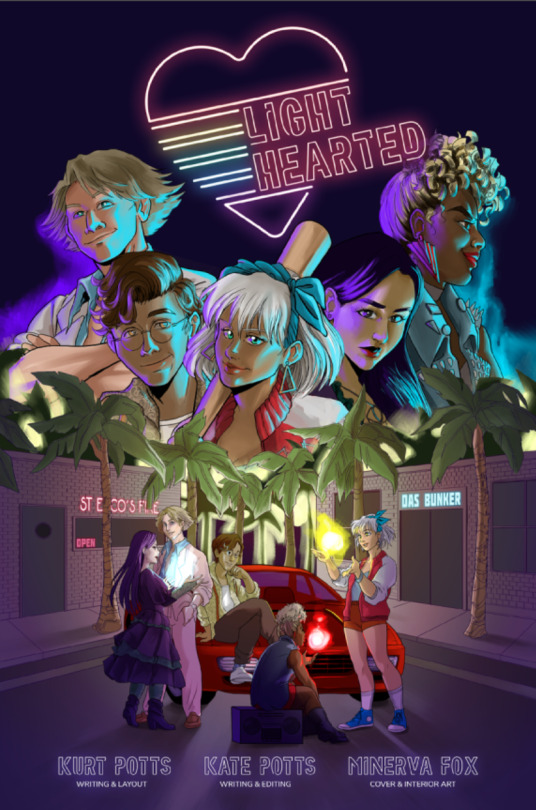
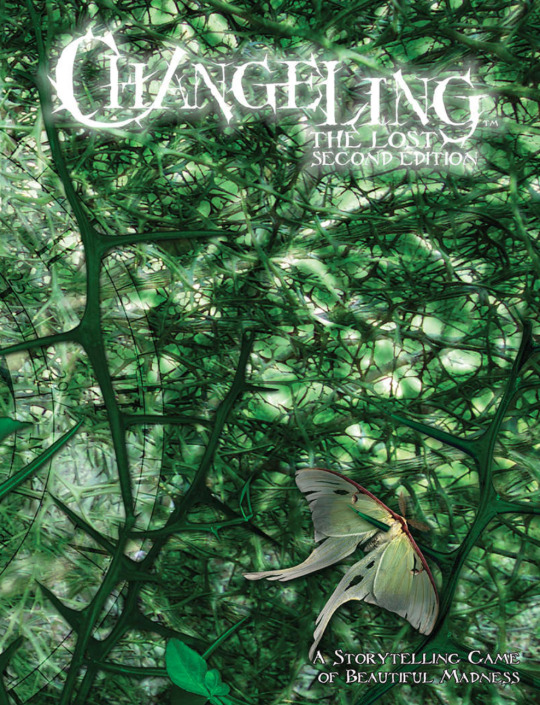

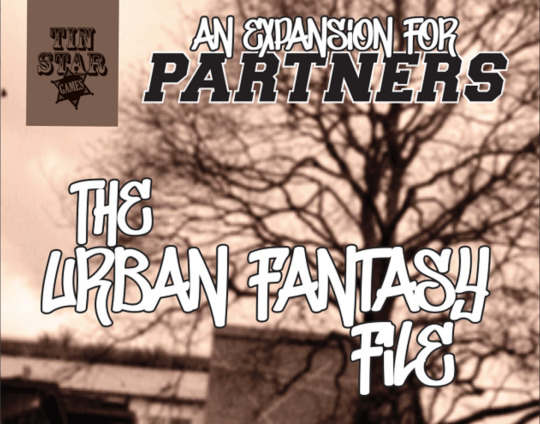

City of Mist, by Son of Oak Games.
City of Mist is a role-playing game of film-noir investigation and super-powered action. It is set in a modern metropolis rife with crime, conspiracies, and mysteries. The protagonists are Rifts, ordinary people who became the living embodiment of a legend, their Mythos. While your Rifts may seek to strike a balance between the mysterious nature of their Mythos and their mortal aspirations, the powers within them always threaten to tear their lives apart. They have unwittingly become a part of a secret world of clashing stories, and soon other legends will come looking for them with demands.
City of Mist is a combination of PbtA and FATE, giving your characters descriptive tags to use for both their benefit and their detriment as they go about solving mysteries in a supernaturally-saturated city. The primary theme of the game is mystery, and thus more than anything your characters will be primed for investigation. That’s not to say that there isn’t violence - but violence and fighting can be de-emphasized if the group is more interested in the mystery side of things.
Character Creation involves a combination of mundane and supernatural themes, as your character is endeavouring to strike a balance with the parts of themselves that they recognize (student, parent, office worker, ex-partner) and the parts of themselves that are hard to understand (mythical beast, deity, folktale, urban legend). What’s important to define is your daily routine, your personality, and what kind of supernatural powers you have.
This game isn’t explicitly anti-violent, but it absolutely provides you with ways to solve problems that aren’t violent, so I think City of Mist is worth checking out.
Scary Monsters & Nice Sprites, by Pammu.
Scary Monsters and Nice Sprites is a narrative RPG about spending your night in one of the only clubs in your city that’s safe for creatures of the night like yourself. All you want to do is have some fun just like the humans do. Play a supernatural creature of choice, put some sick EDM on the speakers and get your game on!
This game works best for an even number of players, up to 6, and is GM-less. It combines urban monsters with flirting, dark clubs and hookups. Each of your characters will look for a partner by doing things that will appeal to the other players. If they like what you do, they’ll reward you with tokens, which you can spend to improve the atmosphere of the club. Fill another player’s intimacy meter, you’ve won them over, and the two of you decide how the night ends for both of your characters.
If you want a game about flirting and the magic of a nightclub, this is your game.
The Far Roofs, by Jenna Katerin Moran.
The Far Roofs is an original role playing system and bundled campaign using pens or pencils, paper, six-sided dice, ten-sided dice, playing cards, and a bag of letter tiles. It's complete in one volume: with this one book and the equipment above, you'll have everything you need to play.
As the story progresses, your characters will gain access to over 150 unique, narrative-focused powers developed and refined over the course of a decade for the Chuubo's Marvelous Wish-Granting Engine RPG before being simplified and adapted for use herein.
The Far Roofs is still being Kickstarted, but Moran’s work on Chuubo’s Wish-Granting Engine produced a game that emphasizes wonder and emotional experience. The Far Roofs looks to deliver along the same lines, and the examples of play point towards investigation, social interaction, and magic powers. Jenna Moran is also known for her unique and evocative storytelling in her work, so I think it’s definitely worth checking out.
Lighthearted, by Kurt & Kate Potts.
Welcome to the magical 80s dream world of Lighthearted. You are a Prep, Jock, Geek, Rebel, or Outcast, like those kids in The Breakfast Club, except you are just about to start magic community college. Through play, we'll explore how you grow out of your high school cliques all while dealing with magical mishaps, college parties, vampires, and worse—finals!
Lighthearted is a complete tabletop roleplaying game that uses the language of film and television to reimagine the coming of age stories popular in 80s teen movies like Weird Science and Sixteen Candles, but with a modern fantasy spin. It's set in an alternate 1980s with fantasy elements weaved into the most outlandish bits of 80’s pop culture. There are fantasy religions mixed in with mall culture, dark magic cold wars, and magical glamours instead of plastic surgery.
This is a game of magic and coming-of-age, as you play first-year students at a magical community college. You’re off to the big city, and the big world - will you survive your first college party? Your first vampire?
The whole game feels like the neon lights of a vibrant night-life combined with the nostalgia of an 80’s film. Your magic is attached to how you feel, so as your emotions change, so will your effectiveness at certain actions. If you want a game that’s as light as its name, and you are seeking out rosy-tinted nostalgia, this might be your game.
Changeling: the Lost, by Onyx Path.
Once upon a time, they took you from your home. They promised you a place at their side, and meaning in your life, and they surrounded you with beautiful things. But the beautiful things were oh so sharp, and they laughed when you bled.
Day by day, they changed you. But day by day, your will grew stronger. On the last day, you smashed your way through the beautiful things and ran, not noticing as you bled or feeling as you cried.
You fought with courage and cleverness and took yourself home. Now the beauty and the horror are yours, to have and to hold and to live.
Welcome to once upon right fucking now.
So I’m familiar only with the 1st edition of Changeling, but as far as I understand, the setting and core premise of the game is the same in the 2nd edition. Changeling: the Lost is a game of fairy trauma. Your characters are survivors of a fae horrorscape, a place both wondrous and terrifying all at once. This game is solidly in the horror genre, but it contains within it a taste of the magical, and it’s also the reason I got into roleplaying in the first place.
As in many Chronicles of Darkness games, fighting is an option in here, but it’s not a wise option. Getting into fights pulls at your characters’ ability to understand the difference between our world and the world of Fae, it’s very easy to sustain supernatural damage that is hard to heal, and, well, sometimes it’s hard to tell who your real enemies are in the first place.
I’d say that Changeling is more of a political game than anything else. Your characters will have to dance through the highly literal wording of faerie pledges, and untangle difficult relationships between Courts that are both safe havens and potential beds of sedition. This is a violent game, but much of the violence possible in Changeling isn’t physical - it's emotional.
This Night On The Rooftops, by C.M. Ruebsaat.
This is a game about gazing out over the smokestacks after dark, with the wind in your hair and a friend at your side and a thousand lights of progress on the streets below.
This Night on the Rooftops is a collaborative storytelling game for 2-5 players about friendship, growing up, and revolution. You will play members of a gang of children in The City, a fantastic world of industry and dying magic, where witches labour alongside factory-workers to make ends meet.
This game looks slightly less modern, but it takes the fantasy aspect of witchcraft and places it inside an industrial city. The game uses a modified version of the No Dice No Masters rule set, which is excellent for stories that have an ebb and flow to them, managed through the use of token expenditure. This game is also GM-less, giving everyone at the table the same amount of control over what happens next.
Since the characters are a gang of teenage witches looking to make ends meet, this game doesn’t strike me as one that prioritizes fighting or violence. The city looks big enough to grind up the characters if they’re not careful, so they’ll likely have to find solutions to problems that don’t get them (or their dependants) in trouble. If the game is like other No Dice No Masters games that I’m familiar with, the group will also have a big say over which elements of the city are the most intriguing to them.
Partners: The Urban Fantasy File, by Tin Star Games.
Some murders are just elf defence…
Vampires are real, magic is real, elves are real - and murder is still very very real. This expansion takes you and your Partner down the moonlit streets of urban fantasy, where the dead sometimes get back up again but crime is still a mystery needing two heads to solve.
The base game for this, Partners, is a two-player mystery-solving game about a pair of detectives, a straight-shooter and a wildcard. You’ll need the base rules to play, but this supplement brings in dead elves, suspicious vampires, and other common characters in any urban fantasy genre. It can work as a one-shot, or as a series of episodes. If you want a game that's primarily about solving a mystery more than anything else, this is is for you.
Solacebound, by Sascha Moore.
Young monsters played at the boundary between the worlds. They slipped and stranded in a human city. Isolated and unwelcome, they search for each others help and a way back.
Solacebound is a GM-less Game for 3-5 people to play over a few hours. Search a sprawling, oppressive city for your friends, find out who is willing to give you a roof, bash back against authorities, cook together and console each other. Will you find a way back home before all passages close?
You are teenage monsters trying to find their way through an urban environment, in a place that is hostile to them. You survive by hiding out, finding each-other, and do things together to make sure you keep each-other healthy. Cards from a deck act as resources, but also as an oracle to help you describe the fallout of any given action, and the emotions that are attached to it. This is a game about metaphors, about what it is like to live in a place that fears you, so I definitely recommend making sure the entire table knows what this is about before starting a game.
You Might Also Want to Check Out
Subway Runners, by Gem Room Games.
186 notes
·
View notes
Note
Should the dev team have committed to Zelda's draconification being permanent and have her stay a dragon at the end, and would that have made for a more honest and poignant ending than the one we got? Some fans think that the ending we got renders her sacrifice completely meaningless and devoid of impact.
The dev team absolutely should NOT have committed to Zelda’s draconification. It would have ruined the entire story and narrative for Zelda’s character and Hyrule itself.
Some people think it made the sacrifice meaningless and devoid of impact. . . But it didn’t. Her choice was her own and it was a statement of dedication to Link and Hyrule as a whole. It was also utterly tragic that she had to do this in order to heal the Master Sword. I am still in utter distress whenever I play the game and watch the memories, despite knowing the ending. Because it’s the tragedy she endured willingly that makes the sacrifice meaningful, not the permanence of it. The sacrifice would hold no value had it been a choice Zelda made knowing she would be reverted.
She didn’t. She thought it was permanent.
And I’m honestly tired of some of these fans just not wanting a happy ending for her character. She deserves peace and a happy life. That’s what she got, which is absolutely justified. And those who think of a story so plainly and only at the big picture miss the details and narratives that point directly towards the ending we actually got.
Let’s talk about if she didn’t turn back.
Firstly, we can start with simple things that personally can be reworked in the future but would create a hurdle for the devs in the future— Zelda would never die as a dragon, she is an immortal being. The Zelda series is quite literally founded upon a reincarnation cycle between Zelda, Link, and Ganon. And only one of them is linked through blood: Zelda. That would cause a bump in the whole reincarnation foundation.
Beyond that, Zelda’s character development would suffer with this choice becoming permanent.
Any fan upset by the ending doesn’t understand the implications of Zelda being granted a second chance. She dedicated her entire life before the calamity to training and praying, only to have her magic awaken AFTER the champions, her father, and nearly Link are killed. Her efforts for the next century keep her body suspended in time and keeps Ganon at bay through her light power. When she wakes up, she is granted a ‘second chance’. In reality, it is simply the life she fought for and rightfully deserved.
So after she made Hyrule her home again, unifying the scarcely populated land and invigorating its culture, she is once again forced to sacrifice everything. This time, she does so as a leader and as one who holds such strong power. Her journey as a Queen leads her to become the very leader she WANTS to be, not the one she was constantly reprimanded to be by her father and the old kingdom. And she learns this throughout her time in the past, with Rauru as her guide.
And that leads us to this point: the belief that to rule is to give up everything.
But where others are punished for this choice (despite Zelda’s warnings, Rauru’s ignorance of Ganondorf’s power leads to Sonia and his own death), Zelda is REWARDED for her choices.
Because she did not just claim that another will defeat Ganondorf and seal him away until present day like Rauru.
Zelda did much more. She raised the sky islands, made a promise with Mineru, solidified the aid of the sages, collected the Master Sword and chose to give LINK the best chance he could have against Ganondorf. Zelda did every single thing she could to ensure Ganondorf would be defeated. She even aids in the final battle, as her will is to end that evil and grant Hyrule the peace she herself will (presumably, to her own knowledge) never experience.
So when she is rewarded for her efforts, by being bathed in sacred light and her body reversed to its previous state. . . It is entirely in line with the narrative thus far. Additionally, Rauru and Sonia present themselves as a ‘second chance parents’ for Zelda. A supportive, patient father in Rauru. A guiding teacher and mother in Sonia.
Tears of the Kingdom mirrors Breath of the Wild in terms of Zelda’s development and story. To give an ending where Zelda remains a dragon. . . It would have been tragic and dishonest to the story that we got.
If you want to read something more in depth and not written by someone with one eye open, this post grants a well rounded answer to this question.
#loz totk#loz totk Spoilers#loz tears of the kingdom#loz totk Zelda#totk Zelda#some people don’t want Zelda to be happy and for those people I hope their pillow is forever hot#I am protective of her because some people just want to misunderstand her and I don’t like that lol#anyway she got to have a peaceful life with link after all this so I am happy :)#zelink#botw zelink#loz botw#botw#the legend of zelda#botw link#link botw#zelda botw#loz tears of the kingdom spoilers#the legend of zelda breath of the wild#Totk zelink
202 notes
·
View notes
Text
Recently, I saw some people criticizing Scott Snyder for trying to make Joker an immortal demon archetype while praising Zdarsky for giving Joker a past and making him more human. And I was like...sorry, but did we read the same comic? Because that was a complete opposite of what actually happened.
Snyder didn't write the Joker as a monster emerging from hell or nothingness. His Joker was a man who found death preferable to the reveal of his real name (DotF). When confronted with the life he left behind, Joker was terrified.
And despite his darndest attempts to reinvent himself and ascend into something beyond mere man (Endgame), he failed.
That's it. That's the very point. He failed.
Hell, Joker might have achieved a modicum of success, had he just left Batman behind. But no, he couldn't help himself. So in his last moment, Batman held him down and forced him to accept his own mortality.
Yet inexplicably, people are so hung up on the introduction of 'the Pale Man' myth even though it can be inferred (rather plainfully so) from the text that Joker was lying.
Batman broke his heart. To retaliate, Joker destroyed his city and haunted him with a tale of the devil whose existence might predate even Gotham itself. Joker knew he outliving Batman was one of Bruce's greatest fears, so in his resentment, he tried to make Batman die believing the Joker to be an unstoppable force of evil that would continue to exist indefinitely without him.
The Pale Man was invented, partly, because Joker wished he could escape from the entwining of their own fates. He no longer relished in the belief that Batman had helped make him.
All in all, I understand not being a fan of Snyder's work. That's absolutely valid. But to accuse him of pushing the narrative of Joker being the devil incarnate is just...unfair.
And wrong.
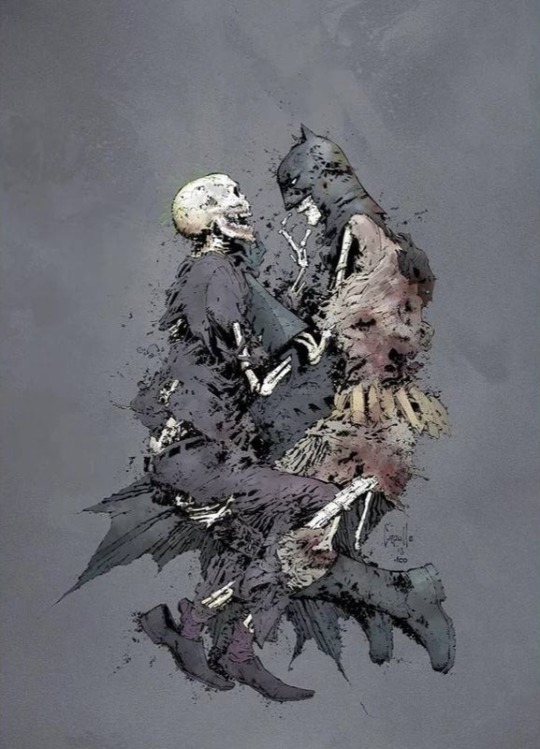
The pic has nothing to do with my rant btw. I'm just upset it was rejected and replaced by something rather generic so I find any opportunity to randomly include it lmao.
170 notes
·
View notes
Note
Hey red, what's your opinion on some modern writing that's very lamp shady? And do you have any advice on how to avoid "Well that just happened" dialogue?
It's an interesting question!
The thing is, lampshading exists for a reason, but it's not the reason it gets used a lot of the time. Writers might lampshade a narrative choice they're insecure about, while characters lampshade because the things they go through in a typical story are kind of bonkers, and we might expect them to notice. If a character signs on for a simple mercenary expedition and ends up discovering they're the long-lost prince of a kingdom they've never heard of, that's weird and they probably feel weird about it. If an ally is determined to 1v1 their super overpowered nemesis with no help from their friends, those friends might have opinions about how dumb that is.
This is a form of lampshading that doesn't break immersion because it's entirely in-character and doesn't lean on the fourth wall. There's a difference between a character noticing how weird their life is and a character pointing out how cliched a recent experience was. In the latter case, the character is treating their life like a story, and while it IS a story, they shouldn't know that.
There's a spectrum here, with "complete sincerity and taking every turn of the plot at face value" defining the 0-point and "complete self-aware uninvestment" at the far end, but healthy levels of lampshading live somewhere in the middle. Characters at the 0-point accepting everything that happens without question can feel just as weird as characters that won't stop pointing out the TVTropes entry they're currently living. It's about what it makes sense for the character to find disruptive or noteworthy. A hardened badass probably won't see the need to point out how bonkers a recent fight scene was, but a newcomer to the Cool Bombastic Adventure scene might be really excited when they pull off a cool special move and want to point it out.
I think this is why the recent D&D movie worked for a lot of people, because while the main characters all lampshade their lives to varying degrees, the way they do so makes sense for all of them. Edgin is a bard and storyteller so he has a slightly meta perspective on a lot of things, purposefully avoids playing along with certain narrative conventions and sometimes responds to other people's dialogue by critiquing their dialogue instead of just responding normally; Holga doesn't really care to understand how the world works and so keeps pointing out that they should just use magic to solve their problems, which is probably the most popular lampshade in the whole genre; Doric and Simon don't get a ton of time to shine character-wise, but they'll both occasionally poke holes in the pretense of the story they're in. The thing that makes this all work is Xenk, who plays absolutely every moment completely 100% straight and is entirely immersed in the objectively ridiculous setting of D&D. Same goes for most of the villains, except for Forge, who's probably the wackiest and most self-aware character in the entire movie, but in a way that makes him feel callous and disregarding of the people around him, like he's uninvested in the world not because he knows he's a fictional character but because he has too much money and power to care about anything. The ways each character does or does not lampshade their surroundings make sense for who they are as people and reinforce their characterization and place in the world instead of undermining it.
I recently watched a couple episodes of Stargate Atlantis and noticed something similar - the main character and, to a lesser extent, the rest of his associates from Earth have a tendency to make wry observations about his objectively bizarre life and the eccentricities of the people around him, which helps contrast against the extremely serious and businesslike Cool Space Warriors they keep accumulating, which helps make them feel (a) distinct from each other and (b) relatable considering all the weird stuff that happens. And the protagonist switches off the quips as soon as things start looking perilous for his team, so you never get the impression that they aren't invested in the story they're living, and as a result the various quips and lampshades come across more as a habit or a coping mechanism than a disruption to the narrative itself.
So basically I think you can get away with a lot of lampshades as long as the character doesn't feel like they know they're in a story.
409 notes
·
View notes
Note
One thing about the Jackson films that bothers me deeply is that they are uncritically upheld as being full of "positive masculinity." Excuse me? This is the series that has Faramir ordering his men to beat Gollum, Aragorn cutting off the Mouth's head, & Gandalf beating up Denethor on multiple occasions (& kicking him into the pyre!). Sam's meanness toward Gollum, while understandable, is never questioned as it is in the book. Frodo is delusional to pity Gollum. Killing is fun, & mercy is silly.
Belatedly, I do agree. I get that the Anglophone media landscape can feel so saturated by absurdly reductive representations of masculinity that what the films do inherit from Tolkien in terms of emotional expression, friendship etc can feel revolutionary. But the films make a lot of minor and major adjustments to transform the story's visions of masculinity to something more conventional and particularly more violent in a way that is often endorsed by the narrative, or at least framed as an understandable if unfortunate exigency of war.
I once pointed out that Aragorn killing the Mouth of Sauron, an ambassador—however distasteful—is something that essentially operates on the worst kind of superhero logic, a sort of good vs evil righteousness-justifies-the-means thing. It's really glaring when based on a book where the character closest to the author is like "it's one thing, however regrettable, to fight to the death to defend ourselves and our people, but morally, evil deeds beyond self-defense cannot be justified by a righteous cause, not even lying to an orc."
Tolkien's version of the Mouth is an evil Númenórean sorcerer who, while he cannot really contend with Aragorn in a battle of wills, is nevertheless a person of the same kind and general capabilities who chose to serve Sauron. The way that the films use design to literally dehumanize the Mouth, to wholly distance him from the heroes he's literally akin to, and justify straight-up killing him although he poses no personal threat, because he's ugly and evil and (evilly) taunting them so they're mad and it's cool—yeah. It's not really that far removed from Gandalf clobbering Denethor being framed as a bit comedic and a bit cathartic, and seems part of a pervasive ethos of the films that seems to have completely fallen out of discussion of them.
I think we especially see this with the handling of not just my main faves, but Frodo, who really suffers in this more conventionally masculine framework. I often felt like the films want the real protagonists to be Aragorn and (to an extent) Sam, and Frodo feels a bit like dead weight from fairly early on. Adorable dead weight, but still, Tolkien's Frodo especially feels like a challenge to this kind of narrative ethos that the films are just not really up to handling.
It's not that everything about masculinity in the films is Terrible Actually, but I do think there are some unfortunate patterns like the ones you mention. And I'm constantly being recommended videos and posts about Aragorn (or others, but mostly Aragorn) as this unproblematic ideal of masculinity where I'm just ... yeah, no. He is interesting to me, including in the context of masculinity specifically, but I absolutely cannot buy the ideal positive masculinity thing.
#anon replies#respuestas#pj critical#anghraine rants#legendarium blogging#legendarium fanwank#the mouth of sauron#gender blogging#jewel of the seashore#aragorn critical#(but specifically film aragorn)#frodo baggins
80 notes
·
View notes
Text
ok I have A Lot of thoughts about the staircase confession (well really about Edwin's whole character arc, but all roads lead to rome) but for now I just wanna say that, yes, I was bracing myself for something to go terribly wrong when I first watched it, and yes, part of me was initially worried its placement might be an uncharacteristically foolish choice made in the name of Drama or Pacing or Making a Compelling Episode of Television but at the expense of narrative sense--
But I wanna say that having taken all that into account, and watched it play out, and sat with it - and honestly become rather transfixed by it - I really think it's a beautifully crafted moment and truly the only way that arc could've arrived at such a satisfying conclusion.
And if I had to pinpoint why I not only buy it but also have come to really treasure it, I'd have to put it down to the fact that it genuinely is a confession, and nothing else.
That moment is an announcement of what Edwin has come to understand about himself, but because it takes the form of a character admitting romantic feelings for such a close friend, I think it can be very easy, when writing that kind of thing, to imbue it with other elements like a plea or a request or even the start of a new relationship that, intentionally or not, would change the shape of the moment and can quickly overshadow what a huge deal the telling is all on its own. But that's not the case here. Since it is only a confession, unaccompanied by anything else, and since we see afterward how it was enough, evidently, to fix the strangeness that had grown between him & Charles, we're forced to understand that it was never Edwin's feelings that were actually making things difficult for him - it was not being able to tell Charles about them. 'Terrified' as he's been of this, Edwin learns that his feelings don't need to either disappear completely or be totally reciprocated in order for him to be able to return to the peace, stability, and security of the relationship with which he defines his existence - and the scale of that relief a) tells us a hell of a lot about Edwin as a character and b) totally justifies the way his declaration just bursts out of him at what would otherwise be such a poorly chosen moment, in my opinion.
Whether or not they are or ever could be reciprocated, Edwin's feelings are definitively proven not to be the problem here - only his potential choice to bottle it up - his repression - is. And where that repression had once been mainly involuntary, a product of what he'd been through, now that he's got this new awareness of himself, if he still fails to admit what he's found either to himself or to the one person he's so unambiguously close with, then that repression will be by his own choice and actions.
And he won't do that. Among other things, he's coming into this scene having just (unknowingly) absolved the soul of his own school bully and accidental killer by pointing out a fact that is every bit as central to his self-discovery as anything about his sexuality or his attraction to Charles is: the idea that "If you punish yourself, everywhere becomes Hell"
So narratively speaking, of course it makes sense that Edwin literally cannot get out of Hell until he stops punishing himself - and right now, the thing that's torturing him is something he has control over. It's not who he is or what he feels, but what he chooses to do with those feelings that's hurting him, and he's even already made the conscious choice to tell Charles about them, he was just interrupted. But now that they're back together and he's literally in the middle of an attempt to escape Hell, there is absolutely no way he can so much as stop for breath without telling Charles the truth. Even the stopping for breath is so loaded - because they're ghosts, they don't need to breathe, but also they're in Hell, so the one thing they can feel is pain, however nonsensical. And Edwin certainly is in pain. But whether he knows what he's about to do or not when he says he 'just needs a tick,' a breather is absolutely not what's gonna give him enough relief to keep climbing - it's fixing that other hurt, though, that will.
Like everything else in that scene, there's a lot of layers to him promising Charles "You don't have to feel the same way, I just needed you to know" - but I don't think that means it isn't also true on a surface level. It's the act of telling Charles that matters so much more than whatever follows it, and while that might have gone unnoticed if anything else major had happened in the same conversation, now we're forced to acknowledge its staggering and singular importance for what it is. The moment is well-earned and properly built up to, but until we see it happen in all its wonderful simplicity, and we see the aftermath (or lack thereof, even), we couldn't properly anticipate how much of a weight off Edwin's shoulders merely getting to share the truth with Charles was going to be, why he couldn't wait for a better, safer opportunity before giving in to that desire, or how badly he needed to say it and nothing else - and I really, really love the weight that act of just being honest, seen, and known is given in their story/relationship.
#dead boy detectives#edwin payne#the case of the very long stairway#im sorry this really IS the short version of my thoughts i swear#i didnt want to get long and rambley backing everything up and mentioning everything else this forces me to reconsider#i just feel like i've barely interacted w this fandom and still seen quite a few odd duck takes on this moment imo#i dont think he wouldntve got the nerve to say it otherwise#(he was already going to! & if anything his new experiences in hell only cement that being the right choice)#and as much as i get what fear can do to a person i still definitely dont think he was resigned to staying in hell if charles reacted badly#i truly think he just couldnt keep it to himself any longer#the show is upfront about his escaping hell being a testament to his own strength rather than a lucky break of some sort#so i think even being on the receiving end of a rescue mission getting out still must take a lot of strength in this universe#and telling charles that definitely made him stronger/in less pain#so yeah totally necessary it happened where and when it did in my book#also i hope it doesnt sound like im being dismissive of anything charles says in this scene#but the way i see it those were all things they both already knew#so reaffirming them just adds to the idea that the act of Telling Each Other Things is what's so important here#rather than counting as a truly separate thing this conversation achieves#just my two cents
141 notes
·
View notes